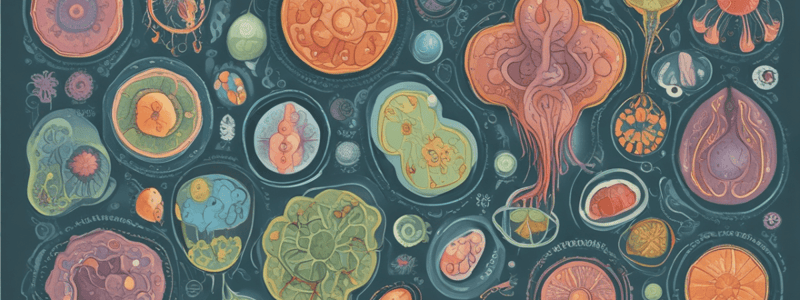Podcast
Questions and Answers
What is the primary function of nucleic acids in cells?
What is the primary function of nucleic acids in cells?
- Energy storage and structural molecules
- Energy conversion and molecular transformation molecules
- Genetic information storage molecules (correct)
- Structural and functional molecules
What is the term for the process by which cells communicate with each other?
What is the term for the process by which cells communicate with each other?
- Metabolism
- Photosynthesis
- Cell Division
- Cell Signaling (correct)
What is the process by which new species are formed?
What is the process by which new species are formed?
- Natural Selection
- Fossil Record
- Phylogeny
- Speciation (correct)
Flashcards are hidden until you start studying
Study Notes
Branches of Biology
- Botany: study of plants
- Zoology: study of animals
- Microbiology: study of microorganisms
- Ecology: study of interactions between organisms and their environment
- Biochemistry: study of chemical processes in living organisms
- Molecular Biology: study of biological molecules and their interactions
- Genetics: study of heredity and variation
- Evolutionary Biology: study of evolutionary processes and history of life on Earth
- Biophysics: study of physical principles underlying biological processes
- Biostatistics: application of statistical principles to analyze biological data
Levels of Organization
- Molecules: basic building blocks of life (e.g. DNA, proteins, carbohydrates)
- Organelles: specialized structures within cells (e.g. mitochondria, chloroplasts)
- Cells: basic units of life (e.g. prokaryotic, eukaryotic)
- Tissues: groups of similar cells performing a specific function
- Organs: structures composed of multiple tissues (e.g. heart, liver)
- Organ Systems: groups of organs working together (e.g. circulatory, nervous)
- Organism: individual living being (e.g. human, plant, animal)
- Population: group of individuals of the same species
- Community: group of different species living in a particular area
- Ecosystem: community and its physical environment
- Biosphere: all ecosystems on Earth
Biological Molecules
- Carbohydrates: energy storage and structural molecules (e.g. glucose, cellulose)
- Proteins: structural, functional, and regulatory molecules (e.g. enzymes, hormones)
- Nucleic Acids: genetic information storage molecules (e.g. DNA, RNA)
- Lipids: energy storage and structural molecules (e.g. fats, oils, cholesterol)
Cell Processes
- Metabolism: energy conversion and molecular transformations
- Photosynthesis: light-dependent energy conversion in plants
- Cellular Respiration: energy conversion in cells (e.g. aerobic, anaerobic)
- Cell Signaling: communication between cells (e.g. hormones, neurotransmitters)
- Cell Division: reproduction and growth (e.g. mitosis, meiosis)
Evolution
- Natural Selection: adaptation and survival of the fittest
- Speciation: formation of new species
- Phylogeny: study of evolutionary relationships between organisms
- Fossil Record: evidence of evolutionary history
Studying That Suits You
Use AI to generate personalized quizzes and flashcards to suit your learning preferences.




